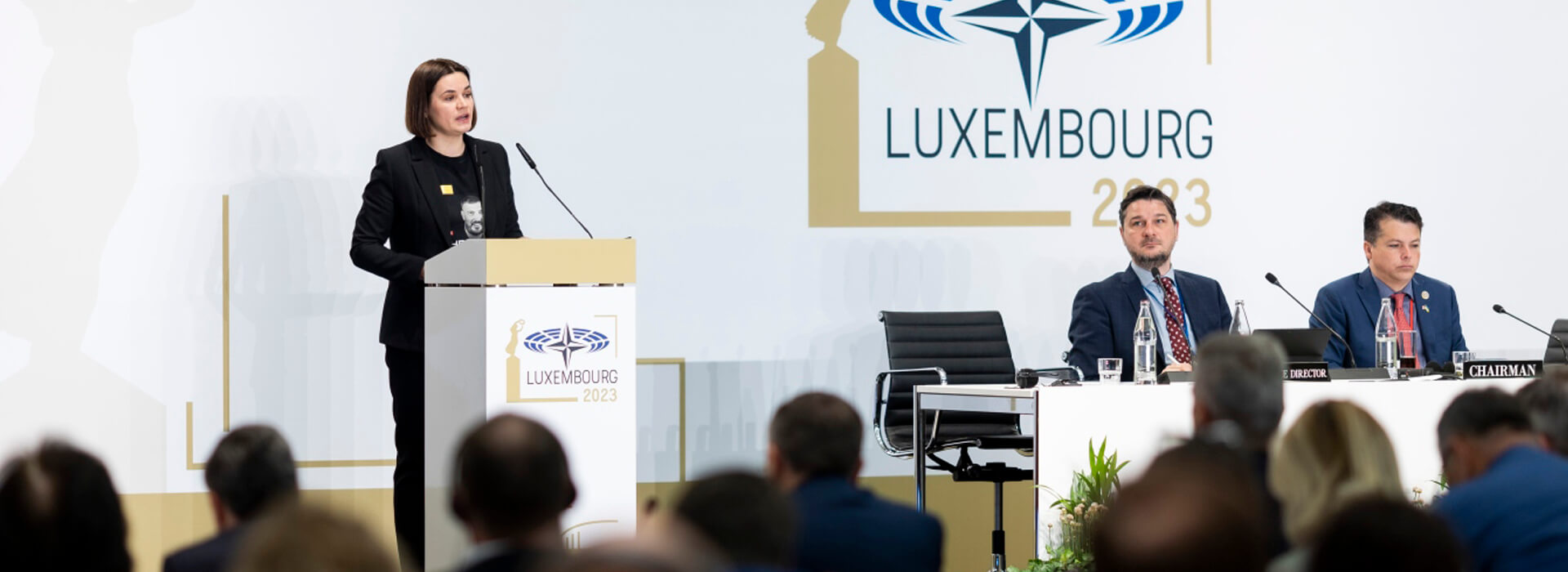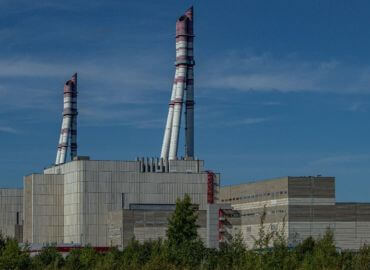- MILITARY DEVELOPMENTS
- POLITICAL DEVELOPMENTS
- HUMAN RIGHTS SITUATION AND INTERNATIONAL RESPONSE
- PROPAGANDA
MILITARY DEVELOPMENTS
Belarus Review (2023 edition, issue 4)
A weekly update on the ongoing political crisis in the Republic of Belarus prepared for you by the International Strategic Action Network for Security (iSANS).
On May 26, the Kastus Kalinoŭski Regiment acknowledged that one of five Belarusian soldiers who were killed in the battle of Bakhmut on May 19 was Miraslau Lazousky, one of prominent leaders of Belarus national movement. Lazousky is best known as a co-founder of «White Legion» – a Belarusian paramilitary organization that was established in 1995 to protect the independence of Belarus after Lukashenka’s rise to power. Although the «White Legion» ceased to exist around 2005, twelve years later the Lukashenka regime detained Lazousky and other former leaders of the organization with the use of a fabricated criminal case.
The Kremlin and its puppet regime in Belarus “signed an agreement” that defines the rules for storing Russian nuclear weapons in Belarus. On May 25, Russia’s minister of defense Sergei Shoigu and the self-declared «Defense Minister of Belarus” Viktar Khrenin signed papers that «regulate» the storage of non-strategic nuclear weapons in the territory of Belarus. The content, as well as the status of the signed documents, remains unknown. From the standpoint of the international law, any and all documents signed by the representatives of the Lukashenka regime should be considered null and void.
Reacting to the news, the Head of the United Transitional Cabinet of Belarus Sviatlana Tsikhanovskaya stated that she aims to do everything possible «to thwart Putin’s and Lukashenka’s plans to deploy nuclear weapons in Belarus» and highlighted that the priority of her team is to completely rid Belarus of Russian influence. The Deputy Head of the United Transitional Cabinet (the Representative for Foreign Affairs) Valery Kavaleuski emphasized that the «nuke deal» between Putin and Lukashenka is illegal, it contradicts the Constitution, and violates Belarus’ international obligations under the Budapest Memorandum and the Treaty on the Non-Proliferation of Nuclear Weapons.
According to Lukashenka, «the transfer of tactical nuclear weapons to the territory of Belarus has already begun«. So far, there has been no hard proofs to Lukashenka’s claim. Despite previous statements by Lukashenka, the Russian side publicly emphasizes that Belarus will not be given control over nuclear weapons. While Russia’s Armed Forces continue to rotate their contingent stationed in Belarus to train Russia’s combatants, Lukashenka and his propaganda continue threatening the neighbors of Belarus with non-strategic nuclear weapons and this topic remains high on the agenda of Lukashenka-controlled media. At the same time, Lukashenka-controlled media attempt to create the image of Belarus as a «neutral state» and a «platform for negotiations» – despite direct participation of the Lukashenka regime in the war and growing tendencies for further militarization of the de-facto government in Minsk.
On May 25, Minsk hosted a meeting of the Council of Defense Ministers of the CSTO. The participants signed a number of documents on perspective joint trainings (for up to 2030) as well as agreed on the regulations on the stocks of CSTO collective forces. Three days alter, «the Armed Forces of the Republic of Belarus» (pro-Lukashenka army located in Belarus) received new delivery of the Russian S-400 anti-aircraft missile system. They were brought to the 25th missile arsenal near Stoubtsy, Minsk region (more details available here). While Lukashenka’s troops are becoming increasingly concerned about the air defense, they pay more attention to the training of the so-called «territorial troops» to confront sabotage and reconnaissance groups, especially in the South and Southeast of Belarus.
POLITICAL DEVELOPMENTS
Last week, the Head of the United Transitional Cabinet of Belarus Sviatlana Tsikhanouskaya attended the NATO Parliamentary Assembly in Luxembourg. Tsikhanouskaya met with the parliamentary delegations of Great Britain, Canada, Portugal, Italy, and Luxembourg. They discussed the strategy of countering the placement of Russia’s nuclear weapons in Belarus, the release of political prisoners, and unlawful transfers and deportation of Ukrainian children to Belarus. Tsikhanouskaya also delivered a speech at the Kyiv Security Forum (remotely) and supported the Peace Formula proposed by President Zelenskyy.
As a result of the meetings in Luxembourg, a group of «Friends of Belarus» will be created in the Luxembourg parliament. Portugal is now, too, considering the creation of such parliamentary alliance. The final declaration of the NATO Parliamentary Assembly in Luxembourg mentions that the parliamentarians of NATO countries are «fully determined to hold Russia’s leaders and troops – as well as their accomplices in Belarus – accountable for atrocities during a joint invasion to Ukraine». The parliamentarians voiced a need for an international tribunal to hear war crimes cases – which may become a turning point for bringing Lukashenka and his subordinates to justice for a wide range of war crimes and crimes against humanity.
In a meeting with the President of the NATO Parliamentary Assembly Joëlle Garriaud-Maylam, Tsikhanouskaya discussed an urgent need for NATO hearings on Belarus during the next Parliamentary Assembly (that will take place in the fall). Tsikhanouskaya urged Garriaud-Maylam to establish a Contact Group between the NATO Parliamentary Assembly and the Belarusian democratic community. In our opinion, the creation of such group at NATO along with a comprehensive Strategic Dialogue between the United States and Belarus and a special liaison group with Belarus at the Council of Europe (that were announced recently) will provide a few effective tracks for intensive Transatlantic integration of Belarus in the upcoming months – including future NATO membership dialogue.
On May 25, the Minister for Foreign Affairs of Iceland Thórdís Kolbrún R. Gylfadóttir visited Sviatlana Tsikhanouskaya’s office in Vilnius. During the meeting, they discussed the outcomes of the Council of Europe (CoE) Summit held in Reykjavik two weeks ago and further action. The summit was held in a unique format that was applied for the first time in the history of the Council of Europe. Although Belarus is not a member of the Council, the CoE leadership made an exception and invited Tsikhanouskaya as a special guest representing the United Transitional Cabinet of Belarus.
Tsikhanouskaya called Gylfadóttir to support a campaign to hold the Lukashenka regime accountable through international courts. During her meeting with Gylfadóttir, Tsikhanouskaya handed over a report from the National Anti-Crisis Management (NAU) on the forcible displacement of Ukrainian children to Belarus. According to NAU, 1,500 Ukrainian children were transferred to Belarus for «re-education» in 2022, and another 1,100 were transported to Belarus from Russia-occupied territories in the first months of 2023.
In response, the Lukashenka regime is now attempting to use Minsk-based UN executives and officials to «launder» the forcible displacement of Ukrainian children to Belarus. For instance, last week Lukashenka’s «Ministry of Foreign Affairs» representative met with local UN officials and complained about «growing politicization of the topic of children on the international agenda». In a press-release published by BelTA after the meeting, the «ministry» claimed that it has a track record of «effective cooperation with UNICEF» on Ukrainian children since 2014.
HUMAN RIGHTS SITUATION AND INTERNATIONAL RESPONSE
On May 22, the trial of Eduard Babaryka (the son of former presidential candidate Viktar Babaryka) began in Minsk. Eduard was detained on June 18, 2020, when he and his father were carrying signatures to the Central Election Commission. After Eduard Babaryka spent three years behind bars awaiting the trial, he is now facing up to 20 years in prison. At the first trial session, Eduard pleaded not guilty to all charges.
Belarusian human rights NGO Human Constanta published its new quarterly report on the main trends in the use of “extremism” and “terrorism” charges in Belarus in January-March 2023. During this period, illegal «amendments to the Criminal Code» entered into force as the regime in Minsk introduced death penalty for officials and the military for “high treason”. New «amendments» introduced new political «crimes» in the de-facto Criminal Code: such as “propaganda of terrorism” and “discrediting the armed forces.” Human Constanta’s recorded an increase in the number of prosecutions on “extremist” grounds – including at least 201 new criminal cases, 58 sentences and 123 administrative «offenses» on the so-called “extremist” grounds over the three months. The legal team of Sviatlana Tsikhanouskaya’s Office prepared a detailed analysis of the deteriorating conditions for political prisoners in detention facilities in Belarus (the complete text is available here).
The practice of detaining acquaintances and relatives of Belarusian volunteers fighting on the side of Ukraine has expanded – as well as the practice of prosecution of people who succumbed to the provocations of pro-Lukashenka activists and security officials in social media. The «courts» across Belarus issued a number of harsh sentences against independent journalists for dissemination of reports about socio-political situation that contradicts the position of the Lukashenka regime.
Human rights defenders continue to register cases of retroactive application of the so-called “anti-extremism legislation». The number of prosecution of administrators of opposition channels and people who donated to solidarity funds, long before such channels and funds were recognized as “extremist”, has increased. Similarly, the «courts» ran by the Lukashenka regime label critical articles in print media or text messages that were sent many years ago as “extremist materials”.
PEN International, the literary and free expression organisation, released a letter signed by 103 Nobel Laureates, expressing solidarity with Belarusian human rights defender, Nobel Peace Prize winner, and PEN member Ales Bialiatski. They call for immediate and unconditional release of Bialiatski, and condemn the Lukashenka regime’s brutal, relentless, and systematic crackdown on independent voices.
PROPAGANDA
Last week, the former editor and co-founder of NEXTA Telegram channel Raman Pratasevich gave two interviews to Lukashenka-controlled media. On May 23, he spoke on the «Belarus 1» TV channel. On May 26, he was featured in a YouTube stream of propagandist Ryhor Azaryonak. In his interviews, Pratasevich thanked the regime «for freedom», begged pro-Lukashenka security forces to forgive him, and criticized his former colleagues as well as pro-democratic Belarusians. In an interview with Azaryonak, Pratasevich mentioned that in case of war, he would fight against the critics of Lukashenka with arms in his hands and may kill his former colleague Stsiapan Putsila if the latter will «endanger his life».
In 2020, a Ryanair plane with Pratasevich on board was forcibly landed in Minsk. During two years before the trial, Pratasevich gave numerous interviews to the Lukashenka regime’s propaganda media and glorified Belarusian dictator. On May 3, «Minsk Regional Court» announced the verdict against three founders and editors of NEXTA. Pratasevich was sentenced to eight years term while his former colleagues Stsiapan Putsila and Yan Rudzik were sentenced to 20 and 19 years in prison (both – in absentia). On May 22, Pratasevich was pardoned and expressed his “immense gratitude to the country and Aliaksandr Lukashenka personally”.
The interviews with Pratasevich are used by propaganda to discredit the protests and the democratic forces and are a part of indoctrination campaign targeting state-employed workers and students. Recent interview with Pratasevich was shown to the students of Baranavichy State University at a cinema hall along with other propaganda films. The students were forced to attend the screening. The event came along with a statement by Lukashenka’s «Chief of Staff» Ihar Serheenka. Serheenka said last week that the “ideological vertical” has not been built in Belarusian universities, and their leadership and students do not perceive the pro-Lukashenka youth organization, Belarusian Republican Youth Union (BRSM, a.k.a. informally as «Lukamol»), as a “leading public organization”. Serheenka stressed that young people absorb «alien values» from social networks and Telegram channels. At the same time, student indoctrination procedures in Belarus are a complete analogy of Stalinist-era «komsomol» and the administrators of BRSM use similar methods of influence – that in a few most recent cases fall under the definition of crimes against humanity.
Best regards,
iSANS team










